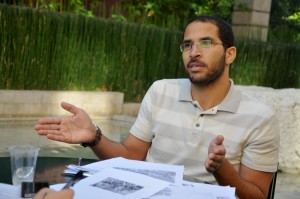Egyptian students talk about protests
When photos of the protests in Cairo’s Tahrir Square hit the media, America was introduced to a muddled collection of images — an endless sea of people, spurts of fire and the foreign scribble of Arabic writing. Initially, it wasn’t clear what was going on, especially as Egyptian President Hosni Mubarak’s regime tried to tighten its grip on what the rest of the world saw, temporarily shutting down the Internet and discouraging journalists from doing their jobs.

Reflection · Hassan Ghozlan, a graduate student studying engineering, looks through photos and news clips from his war-torn country, Egypt. - Stephanie Guo | Daily Trojan
But to engineering Ph.D. student Hassan Ghozlan, an Egyptian citizen who came to the United States for the first time in Fall 2009 to attend the Viterbi School of Engineering, the pictures were personal. They showed the square just across the Nile from his home, the place where a month ago he bought novels from a bookstore in the square.
And for freshman Richard Sidhom, whose family left Egypt and came to the United States when he was nine years old, the protesters in the streets of Alexandria, Sidhom’s birthplace, were cousins, distant relatives and friends that he had left behind.
The protests, which have been going on since Jan. 25, represent to Ghozlan and Sidhom a power struggle between Mubarak’s regime and the masses of average Egyptians who have been suffering for too long under Mubarak’s rule.
“It was not religious, it was not an Islamic uprising,” Ghozlan said. “It’s just people: engineers, university professors, doctors, average people. It was the youth, and that’s why it has hope to be successful.”
Both Ghozlan and Sidhom were raised under Mubarak’s rule and taught from a young age to refrain from speaking out in order to protect themselves — never to get into a fight or walk into a protest or hold a sign. Ghozlan compares Mubarak’s 30-year rule to that of Big Brother in George Orwell’s 1984.
It was always never do this, never do that, especially for Sidhom, who is a Coptic Catholic, a minority in Egypt.
But according to Ghozlan, the current protests transcend religious differences. To him they represent good, middle-class Egyptians standing up against a certain evil that has overstayed his welcome as their ruler.
“[Religion] is the card the [Mubarak] regime plays to the West — it’s either me, or the Muslim Brotherhood and the extremists,” Ghozlan said. “And people buy that.”
This isn’t the only issue Ghozlan feels Mubarak has swept under the rug. He believes that, over the last 10 or 15 years in particular, the regime has been a sham, featuring acts of deceit, corruption and oppression.
Videos have been leaked of Egyptian Parliament members being told how to vote and not being able to do otherwise. A Mubarak opponent trying to run for the presidency was sentenced to prison on counts of forgery. A ferry boat unfit for use sank in the waters of the Red Sea, drowning more than 1,300 Egyptians. These and thousands of other acts have seemed to go unpunished — until now.
“You don’t see what’s going under the carpet,” Ghozlan said. “People are boiling, people are mistreated, the regime is oppressive.”
This dynamic can be seen in the photos recently released. In one, an anti-Mubarak protester sits in the square holding a sign written in Arabic that translates to “Come on Hosni! I need to go home to grade the exams,” while in another, members of Mubarak’s National Democratic Party barge through the crowds on horse and camelback, a sight Ghozlan hadn’t seen in the square in the 25 years he lived in Cairo.
It is acts like these that lead Ghozlan to believe Mubarak cannot be trusted. Whether right now or in eight months, when the national elections are planned to take place. Ghozlan supports an immediate transfer of power, though he doesn’t think Mubarak needs to be exiled from Egypt for this to be successful.
Sidhom, on the other hand, is not quite as convinced. As a Coptic, he is somewhat wary of the Muslim Brotherhood taking over, and believes that if this occurs, it could cause problems for Egyptian Coptics. The worst-case scenario would be a Coptic diaspora from Egypt, according to Sidhom. But above all, he wants what is best for Egypt as a whole.
“What I’ve been noticing is on one hand, you have some people who are taking advantage of the chaos to act out these anti-Coptic feelings,” Sidhom said. “But on the other hand you have a lot of people who right now are saying, ‘We’re not Coptics and Muslims; we’re all Egyptians.’”
This nationalistic mentality can be seen both in the heart of Tahrir Square and thousands of miles away in Los Angeles, where Ghozlan and Sidhom can openly voice their opinions about Mubarak and what they see fit for the future of Egypt.
“It’s when one looks at the world and sees democracy and sees how things are run in democratic countries that he realizes how cruel it is to live in such a society,” Ghozlan said.
For more stories on the crisis in Egypt, click here.

The well-presented interview by Phoebe Unterman, Trojan 7 Feb., showed a view of the Cairo protests that we haven’t found in the national news. The young student, Hassan Ghozlan, a recent arrival from Egypt gave us a youth-oriented picture of the underlying problems that caused the protests.